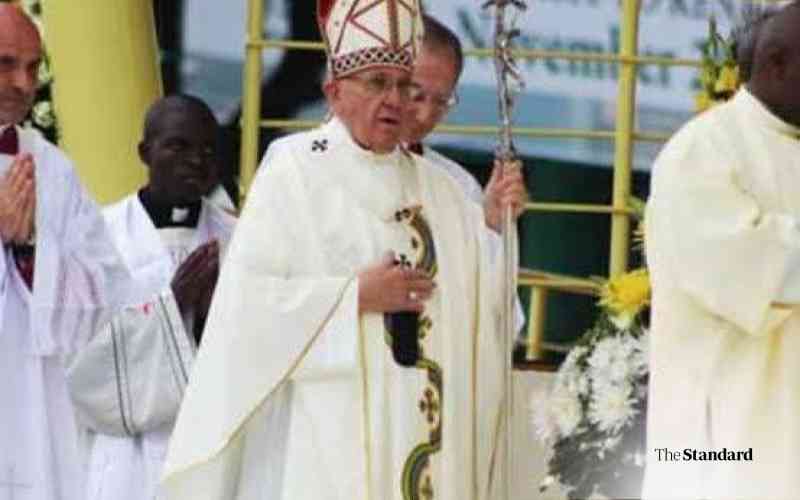
The late Pope Francis, wearing a beaded Mitre made by Lydai Letipila, a widow from Baragoi, Samburu County. 24 April 2025. [Courtesy, Standard]
Mama Lydia Letipila, a widow residing in Baragoi, Samburu North, is mourning the death of Pope Francis.
She is credited with making the beaded mitre that Pope Francis wore during a mass in Nairobi in 2015
Letipila, a talented beadwork artist, is known for her ability to create virtually anything from beads.
Local admired her skills. Letipila can craft ties, belts, bangles, earrings, and more, and she acknowledges that there seems to be nothing she cannot recreate.
Her talent gained international attention when Pope Francis visited Kenya in 2015.
During a mass at the University of Nairobi, the Pope wore a mitre made from goatskin and intricately crafted by Letipila, who is the mother of seven.
Despite losing her sight, Letipila spoke little about the late Pope, focusing instead on praying for his soul.
The Catholic Diocese of Maralal, led by the now-retired Bishop Vigilio Pante, approached her with a request to create a mitre for the bishop.
Meanwhile, the Bishop of the Catholic Diocese of Kericho, Alfred Rotich, has weighed in on the ongoing global debate surrounding the succession of the late Pope Francis.
He emphasised that the process should be guided entirely by the Holy Spirit, rather than regional considerations.
Speaking at the Kericho Cathedral, Bishop Rotich reminded the faithful that the Pope is a universal leader who serves as the Vicar of Christ for Catholics across the globe, regardless of origin.
“The process of electing the Pope is very detailed. After the mourning session of Pope Francis, there will be a sitting by the 135 Cardinals in Rome who will pray for divine guidance in choosing the new Pontiff,” said Bishop Rotich.
He noted that the faithful worldwide are praying for a Pope who will uphold the unity and spiritual mission of the Catholic Church, adding that the nationality or continent of origin should not be a defining factor.
“Whether he comes from Africa, Europe, or Asia, the Pope does not represent a continent but the entire Catholic Church. Our hope remains in the Holy Spirit to choose for us the shepherd who will lead the Church,” added Bishop Rotich.
Stay informed. Subscribe to our newsletter
While expressing hope that one day a Pope may come from Africa, Bishop Rotich stressed that this is not a demand or expectation, but a humble aspiration that must be left to the will of God.
“We are not desirous that he must strictly come from Africa. We let the Holy Spirit choose for us the Pope, and we will accept the decision,” he said.
At the same time, Bishop Rotich raised concerns over the rise of cults in Kenya and called on the government to act swiftly and decisively.
“It is unacceptable for some individuals to misuse religion to mislead vulnerable members of society. The government must rein in such individuals to protect our communities,” he said.